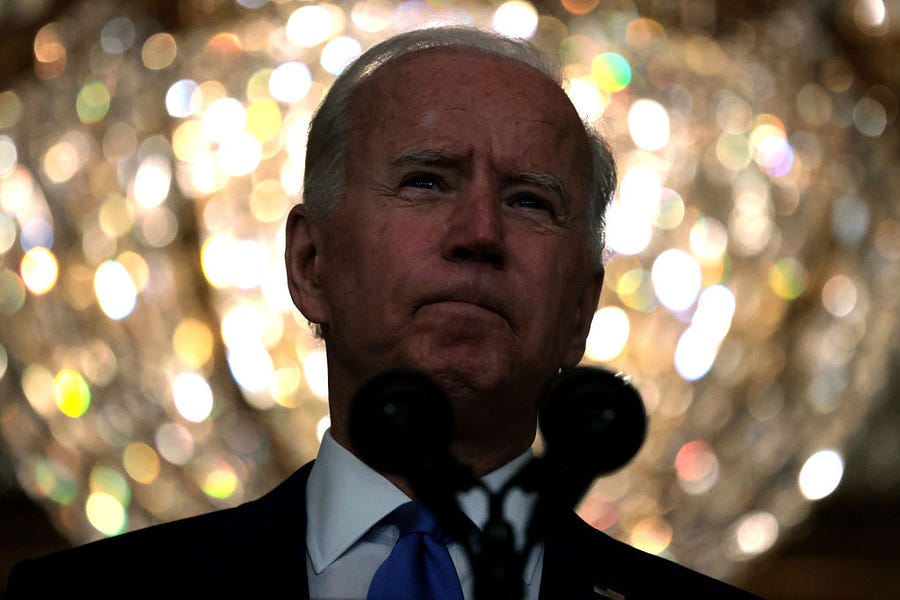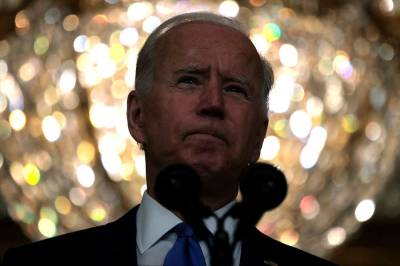One year into his presidency, Joe Biden endeavors to pivot away from the Middle East. The Middle East simply won’t let him. Like his predecessors, the president continues to struggle with the right approach to this important and perilous region. To date, many of Biden’s approaches have amounted to unforced errors. A number of them are likely to haunt him.
Afghanistan: Though the country is not technically not part of the Middle East, Biden’s disastrous withdrawal from Afghanistan last year continues to impact how states in that region view America’s role in their neighborhood. The botched sequencing of the withdrawal was the primary focus (removing military assets before political assets). But the fact that the U.S. described the Taliban terrorist group as a “partner” in its retreat sent shockwaves around the world. Moreover, the Arab states and Israel cannot help but note that a ragtag, untrained army forced a superpower to flee under duress. Admittedly, the Taliban had help from state sponsors (notably Pakistan and Iran). However, the neo-isolationist trends in American politics that ultimately justified the embarrassing and unceremonious end to this American war effort raises troubling questions about the future of the U.S. commitment to the order it established in the Middle East. It’s also worth remembering that the defeat of the Soviet army at the hands of the mujahedeen in 1989 inspired Osama bin Laden (and his Palestinian partner Abdullah Azzam) to leverage the Islamist fighters (who believed that theirs was a divine victory) to create the al-Qaeda terrorist network. Whether we witness a resurgence in Islamist terrorism as a result of Biden’s Afghanistan disaster remains to be seen.
Iran: In the wake of the Afghanistan debacle, the region is nervously watching as the White House signals its intent to completely capitulate to the clerical regime in Tehran at the negotiating table in Vienna. The administration’s determined effort to rejoin the deeply flawed nuclear agreement of 2015 at any cost has yielded too much leverage to the world’s most prolific state sponsor of terrorism. While the negotiations have not yet concluded, it appears that the regime will walk away having legitimized a number of its alarming advances toward a nuclear weapon, with the Biden administration demanding fewer restrictions and granting tens of billions of dollars in sanctions relief as remuneration for a weaker deal. The White House is aware of the terrible optics. The concerns are even more acute in light of the fact that most of Iran’s nuclear expansion occurred after Biden’s election. This was the result of Biden’s decision to reverse “maximum pressure” to what can only be described as “maximum deference.” Rumors are now swirling that the White House has sought out a high-priced public relations firm to handle the fallout. In the meantime, officials are doing their best to blame the Trump administration for whatever terrible deal is reached, citing Trump’s hasty exit from the nuclear accord in 2018. Try as they may, whatever deal is struck will be Biden’s to own. Right now, the chances are high that Iran pockets American concessions and still makes a dash for a bomb.
Saudi Arabia: In the early days of the Biden administration, the White House took a series of steps to deliberately alienate Riyadh. Biden pulled support for the Saudi-led war against the Iran-backed Houthis in Yemen, delisted the group as a foreign terrorist organization, and then released information implicating crown prince Mohammed Bin Salman (MBS) in the brutal murder of Jamal Khashoggi at the hands of Saudi operatives in 2018. These moves were all counterproductive. The Saudis are leading the only military effort to halt the dangerous Houthi advances in Yemen. The group is undeniably a terrorist group, as evidenced by a subsequent sanctions imposed by this administration on individual leaders of the Houthis. And while the Saudis should be lambasted for Khashoggi’s killing, the information released about MBS was not new; it was an obsequious nod to the “progressive” wing of the Democratic Party that has labored to vilify Saudi Arabia. All three moves only served to drive a wedge between Riyadh and Washington. The Houthis continue to sow terror throughout the region, with a recent drone attack on the UAE capital of Abu Dhabi. Meanwhile, by deliberately injecting tensions into its relationship with Riyadh, the White House has squandered an opportunity to broker a valuable normalization agreement between Saudi Arabia and Israel. Given Saudi Arabia’s status as guardian of the two holiest sites in Islam, such an agreement would almost certainly inspire others in the Arab and Muslim worlds to follow suit.
Israel: The Israelis were truly thankful for Biden’s support during the Gaza War in May 2021. Biden blocked efforts to vilify the Israelis at the United Nations, and delivered the right messages at home to support Israel’s operations against Iran-backed Hezbollah. However, two days before the conflict ended, Biden’s rhetoric shifted dramatically. He blamed Israel for not bringing about a swifter end to the conflict, even though he knew an Egyptian-brokered ceasefire was imminent. Once again, Biden was trying to score points with the hard left of his party. Since then, with a change in government in Israel, the administration has worked hard to build a solid foundation with new Prime Minister Naftali Bennett. However, the lack of American resolve to remain engaged in the region, coupled with the looming Iran nuclear deal, leave many Israeli questions unanswered about the reliability of its most important ally.
Competing with China: Amid all of this, the administration has placed significant pressure on Israel to dial back on its commerce with Beijing. Specifically, the White House wants Israel to halt the sale of technology that could be exploited by the Chinese for military purposes. Israel has taken significant steps to do exactly that. But the administration is not holding the rest of the Middle East to the same standards. The foreign ministers of Saudi Arabia, Kuwait, Oman, and Bahrain, and the secretary-general of the Gulf Cooperation Council (GCC) all visited China recently for talks designed to take trade and security cooperation to the next level. The Biden White House has not mounted a meaningful response. Nor has it done anything to disrupt the 25-year strategic partnership worth $400 billion between Iran and China, signed in March of last year. If anything, the sanctions relief that the White House seeks to offer Tehran in the Vienna negotiations will only boost the value of this pact.
Global crises loom: China is eyeing an invasion of Taiwan. Russia has amassed troops around Ukraine. North Korean missiles are flying. A lack of American deterrence (the credible threat of a military response), as conveyed by the Biden White House, has likely contributed to these crises. Strong American leadership in response to these crises could help convey a sense of calm in other regions, such as the Middle East. A lack of American leadership will only lead to further destabilization. How the Biden administration tackles these challenges in 2022 could have immense consequences for his presidency, not to mention the political and military trajectory of the broader Middle East.
Jonathan Schanzer, a former terrorism finance analyst at the U.S. Department of the Treasury, is senior vice president for research at Foundation for Defense of Democracies. His new book, Gaza Conflict 2021: Hamas, Israel and Eleven Days of War (FDD Press) was released in November. Follow him on Twitter @JSchanzer.






Please note that we at The Dispatch hold ourselves, our work, and our commenters to a higher standard than other places on the internet. We welcome comments that foster genuine debate or discussion—including comments critical of us or our work—but responses that include ad hominem attacks on fellow Dispatch members or are intended to stoke fear and anger may be moderated.
With your membership, you only have the ability to comment on The Morning Dispatch articles. Consider upgrading to join the conversation everywhere.